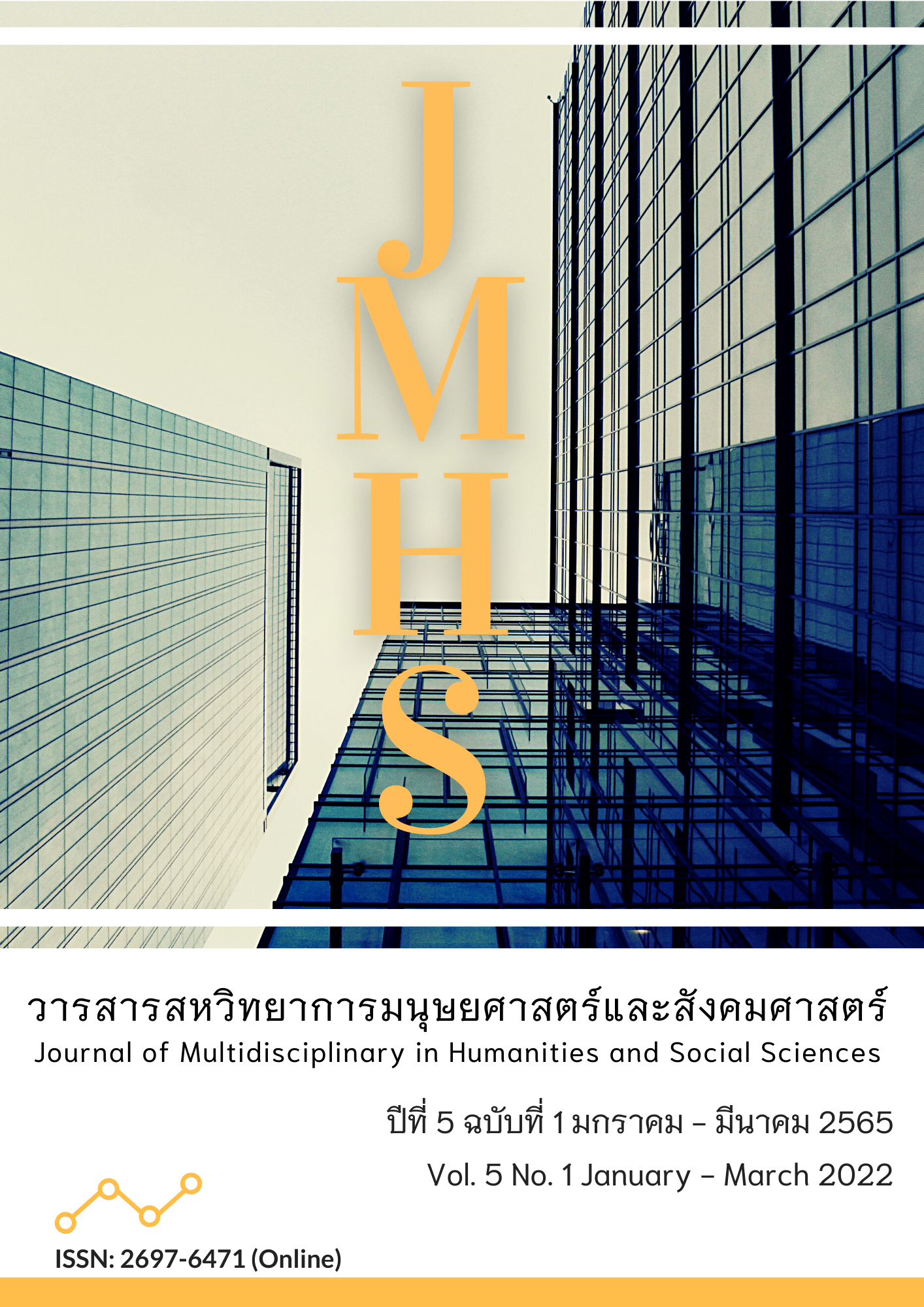The Performance Factors of Happiness Affected the Cabin Crews’ Quality of Life
Main Article Content
Abstract
The purpose of this research was to study the effects of Work Load (WL), Work Stress (WS), Happy Work Environment (HWE), Quality of Work Life (QWL) on Happy Work (HW) of Thai Cabin Crew By using mixed methods that focused on quantitative and qualitative data collection. Qualitative data were obtained from in-depth interviews and Focus Group totally with 7 key informants. Quantitative data were collected from 408 Thai Cabin Crew using electronic questionnaires. The results of this paper were investigated the influence of various variables that contributed to the Happy Work (HW) of Thai Cabin Crew found that the Work Load (WL) was the most influential, the operational stress (WS), the condition of work., the Happy Work Environment (HWE), Quality of Work Life (QWL) respectively.
Article Details

This work is licensed under a Creative Commons Attribution-NonCommercial-NoDerivatives 4.0 International License.
Views and opinions appearing in the Journal it is the responsibility of the author of the article, and does not constitute the view and responsibility of the editorial team.
References
Amornpipat, I. 2018. Quality of Work-life of Pilots: A Literature Review and Research Agenda. Kasem Bundit Journal, 19(Special), 367-377.
Beloor, V., Nanjundeswaraswamy, T. S., & Swamy, D.R. (2017). Employee Commitment and Quality of Work Life – A Literature Review. The International Journal of Indian Psychology, 4(2), 2349-3429.
Bertini, C., & Boonsongpaisan, N. (2016). A Study of a Happy Workplace in an Oil & Gas Company. Journal of Business Administration and Languages (JBAL), 4(2), 13-20.
Best, J. W. (1981). Research in Education. (4th ed.). New Jersey: Prentice – Hall
Dechawatanapaisal, D. (2017). The Mediating Role of Organizational Embeddedness on The Relationship Between Quality of Work Life and Turnover: Perspectives from Healthcare Professionals. International Journal of Manpower, 38(5), 696-711.
Fernandes, R. B., Martins, B. S., Caixeta, R. P., Filho, C. G. C., Braga, G. A., & Antonialli, L. M. (2017). Quality of Work Life: An Evaluation of Walton Model with Analysis of Structural Equations. Espacios, 38(3). https://www.revistaespacios.com/a17v38n03 /a17v38n03p05.pdf
Hawkins, F. H. (2017). Human Factor in Flight London. (2nd ed.). London: Taylor and Francis.
Inegbedion, H.E., Inegbedion, E., Peter, A.O., & Harry, L. (2020). Perception of Workload Balance and Employee Job Satisfaction in Work Organizations. Heliyon, 6(1), E03160. https://doi.org/10.1016/j.heliyon.2020.e03160
Islam, A., Jantan, H.B., Bashir, A., Masud, S., & Roy, B. (2017). Work Stress Among Managers of Business Organizations in Bangladesh. The International Journal of Business & Management, 5(10), 16-23.
Nayak, T., & Sahoo, C. K. (2015). Quality of Work Life and Organizational Performance: The Mediating Role of Employee Commitment. Journal of Health Management, 17(3), 263–273.
Nwinyokpugi, P.N. (2018). Workload Management Strategies and Employees Efficiency in The Nigeria Banking Sector. International Journal of Innovative Research & Development, 7(1), 286-293.
Rajan, D. (2018). Negative Impacts of Heavy Workload: A Comparative Study Among Sanitary Workers. Sociology International Journal, 2(6), 465-474.
Schultz, D. P., & Schultz, S. E. (1994). Theories of Personality. (5th ed.). California: Thomson Brooks/Cole Publishing.
Sribenchamas, N., Samruayruen, K., Srijaroen, W., krongdee, N., & Paengprang, S. (2019). Factors Predicting to Job Stress Among Hospital Personnel. EAU Heritage Journal, 9(3), 194-201.
Sribenjamas, N. et al. (2019). Factors Predicting Stress in The Work of Hospital Personnel in Phitsanulok Province. Academic Journal Eastern Asia University, 3, 194-201
Sriprasertsuk, A. (2015). Stress Management: The Basic Way to Healthy. Phranakhon Rajabhat Research Journal, 10(2), 203-214.
Stanton, N. A., & Young, M. S. (2000). A Proposed Psychological Model of Driving Automation. Theoretical Issues in Ergonomics Science, 1(4), 315-331.
Sui, O. L., Lu, L., & Cooper, C. L. (1999). Managerial Stress in Hong Kong and Taiwan: A Comparative Study. Journal Of Managerial Psychology, 14(1), 6-25.
Sun, K.S., Chiou, H. (2011). Aviation Ground Crews: Occupational Stresses and Work Performance. African Journal of Business Management, 5(7), 2865-2873.
Thidarak, L., & Kritsdakon, Y. (2017). Concept and Measurement of Happiness at Work Phetchabun Rajabhat Journal, 19(2), 9-18.
Vanichbuncha, K. (2011). Statistical Analysis. Bangkok: Chulalongkorn University Book Center.


